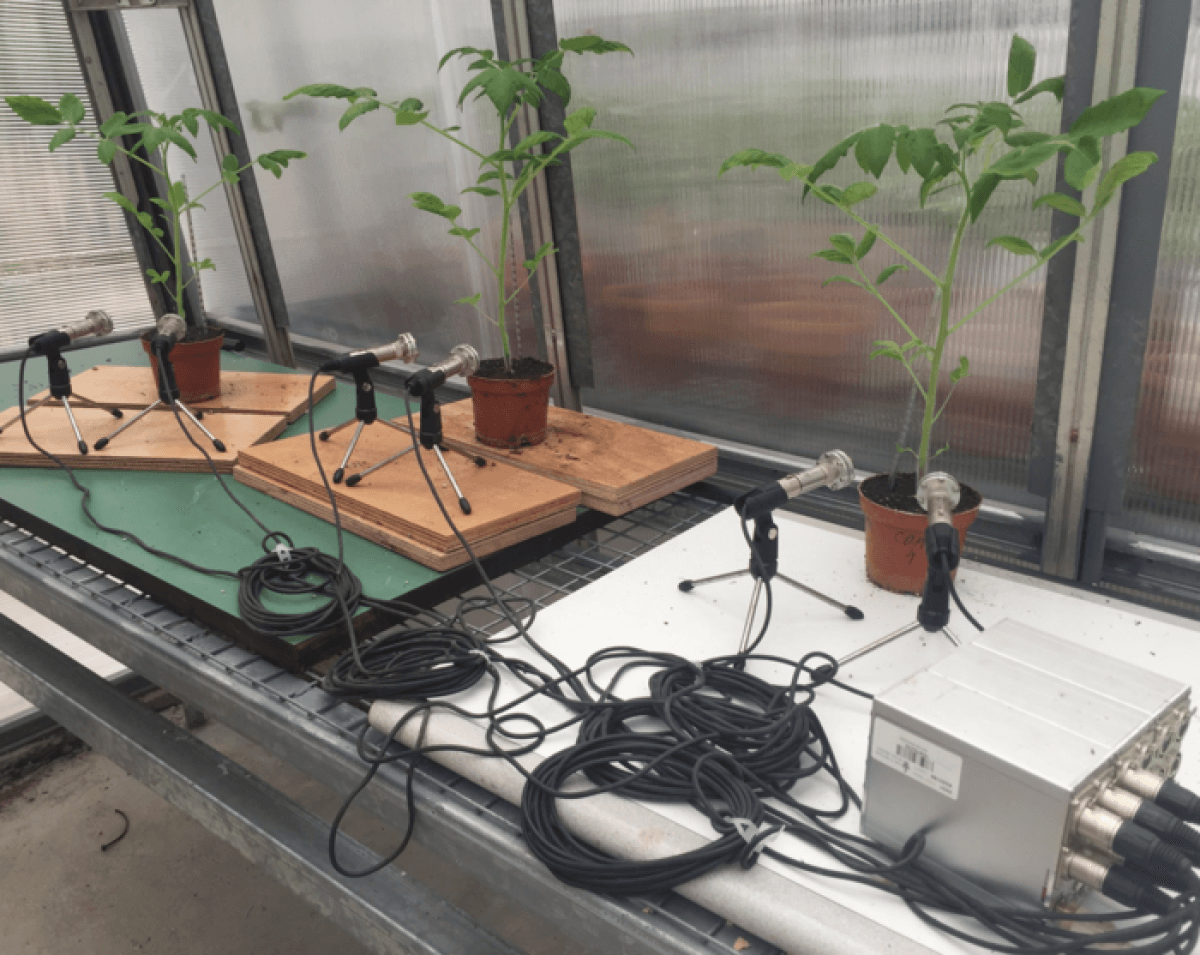TEL AVIV, Israel — Do plants make sounds? As it turns out — they do! Tomato plants “scream” when a stem is cut off, a new study reveals. They actually emit airborne sounds similar to “bubble-wrap being popped” that is detectable from more than three feet (39.3 inches) away when they are thirsty.
Although it’s hard to detect for humans, animals will be able to hear the sounds, meaning that plants can communicate with their surroundings far more than we realize. It also means that by “listening” in, farmers will be able to tell when their crop is suffering from stress.
Israeli researchers discovered that tomato and tobacco plants which are under pressure – from dehydration or having their stems severed – give out sounds that are comparable in volume to normal human conversation. The frequency of the noises is too high for human ears to detect, but it’s possible for insects, other mammals, and possibly even other plants to hear them.
“Even in a quiet field, there are actually sounds that we don’t hear, and those sounds carry information,” says senior author Lilach Hadany, an evolutionary biologist and theoretician at Tel Aviv University, in a media release. “There are animals that can hear these sounds, so there is the possibility that a lot of acoustic interaction is occurring.”
Although scientists have previously recorded ultrasonic vibrations coming from plants, Prof. Hadany says the new study is the first evidence that they are airborne, a fact that makes them more relevant for other organisms in the environment. “Plants interact with insects and other animals all the time, and many of these organisms use sound for communication, so it would be very suboptimal for plants to not use sound at all,” says Hadany.

When are these plants ‘communicating’ the most?
Researchers used microphones to record healthy and stressed tomato and tobacco plants, first in a soundproofed acoustic chamber and then in a noisier greenhouse environment. They stressed the plants using two methods: by not watering them for several days and by cutting their stems.
After recording the plants, the researchers trained a machine-learning algorithm to differentiate between unstressed plants, thirsty plants, and cut plants. The team found that stressed plants emit more sounds than unstressed plants.
They say the plant sounds resemble pops or clicks, and a single stressed plant emits around 30 to 50 clicks per hour at seemingly random intervals, but unstressed plants emit far fewer sounds. “When tomatoes are not stressed at all, they are very quiet,” the study author continues.
CLICK TO LISTEN: Recordings Of Plant Sounds
Water-stressed plants began emitting noises before they were visibly dehydrated, and the frequency of sounds peaked after five days with no water before decreasing again as the plants dried up completely. The researchers note that the types of sound emitted differed with the cause of stress.
The machine-learning algorithm was able to accurately differentiate between dehydration and stress from cutting and could also discern whether the sounds came from a tomato or tobacco plant.
Do other plants scream in the same way?
Although the study focused on tomato and tobacco plants because of their ease to grow in the lab, the research team also recorded a variety of other plant species.
“We found that many plants—corn, wheat, grape, and cactus plants, for example—emit sounds when they are stressed,” Hadany reports.
The exact mechanism behind the noises is unclear, but the researchers suggest that it might be due to the formation and bursting of air bubbles in the plant’s vascular system, a process called cavitation. Whether or not the plants are producing these sounds to communicate with other organisms is also unclear, but the scientists say the fact that the sounds exist has big ecological and evolutionary implications.
“It’s possible that other organisms could have evolved to hear and respond to these sounds,” Hadany says. “For example, a moth that intends to lay eggs on a plant or an animal that intends to eat a plant could use the sounds to help guide their decision.”

The study author adds other plants could also be listening in and benefiting from the sounds.
Prof. Hadany and other members of the team previously showed that plants increase the concentration of sugar in their nectar when they “hear” the sounds made by pollinators, while other studies have shown that plants change their gene expression in response to sounds.
“If other plants have information about stress before it actually occurs, they could prepare,” the researcher adds.
Could this help farmers better take care of crops?
Sound recordings of plants could help agricultural irrigation systems monitor crop hydration status and help distribute water more efficiently, according to the research team.
“We know that there’s a lot of ultrasound out there—every time you use a microphone, you find that a lot of stuff produces sounds that we humans cannot hear—but the fact that plants are making these sounds opens a whole new avenue of opportunities for communication, eavesdropping, and exploitation of these sounds,” says co-senior author Yossi Yovel, a neuro-ecologist at Tel Aviv University.
“So now that we know that plants do emit sounds, the next question is—‘who might be listening?’” Hadany concludes. “We are currently investigating the responses of other organisms, both animals and plants, to these sounds, and we’re also exploring our ability to identify and interpret the sounds in completely natural environments.”
The findings are published in the journal Cell.
South West News Service writer Mark Waghorn contributed to this report.

Have you compared different types of tomatoes or GMO tomatoes to non GMO?
L Ron Hubbard was the first to discover this decade’s ago with his e-meter. Just cuz he inspired the crazy cult of scientology dosent mean he still didn’t make that one scientific achievement. Next time give credit where its due or else your publication seems uniformed or willing to leave out information to aprear “woke” or “pc”. Either way it doesn’t look good for you.
I doubt they are deliberately ignoring previous work in listening to plants, although they might consider that to be info from another world. Maybe the folks at Tel Aviv University are simply ignorant about Hubbard and his e-meter.
You forgot who published this news,didn’t you? Smiles